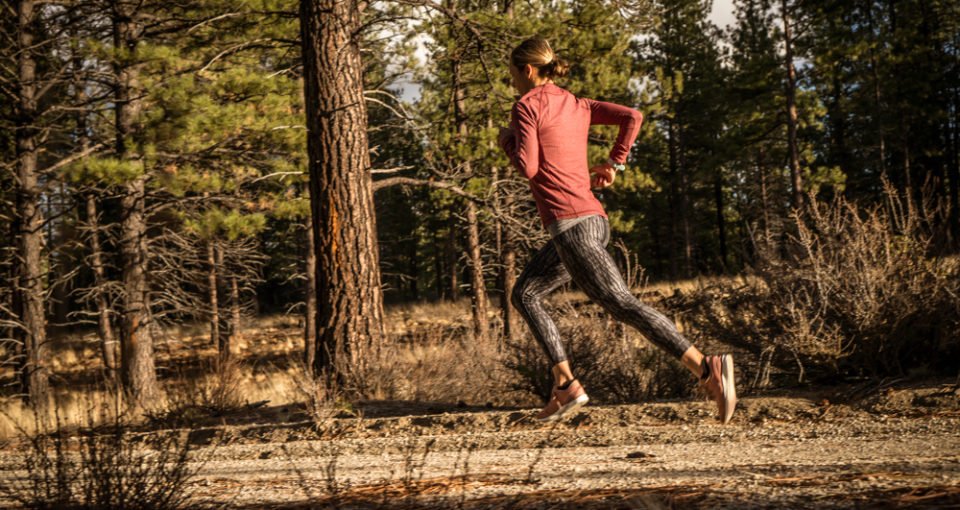Training Notes: Professional Ironman Triathlete Linsey Corbin
Will Ross, January 1, 2018

American long-course triathlon champion Linsey Corbin knows how to maintain top form, having recently completed her 10th season of rigorous 70.3 and full-distance Ironman racing. The idyllic base of Bend, Oregon puts Corbin in the palm of some outstanding terrain for training and competing, not least because this 90,000-population town is full of elite endurance athletes.
Corbin manages to sync her travel and training, meaning that being away from the mountains doesn’t necessarily damage her in-season performances. In this interview she discloses the framework and tricks that have brought back results for over a decade.
Where do you usually train?
I generally train 75% of the year out of my home-base, Bend, Oregon. The other part of the year I am at various training camps in Florida, Arizona and / or Hawaii.
How important is location for your training- access to terrain or facilities?
Location for training is very important for me. When looking for ideal training locations I look for ease of access to training (can you ride from your door, run from your house, logistically easy to get to pool / gym / to and from sessions), I look for good weather, I look for good resources (physio, massage, gym access). I also look for places that are inspiring for me – for example, I love the mountains and feel at home climbing and on the trails.
What does a typical week look like when you’re at your home base?
- Anywhere from 9-16 hours of cycling per week
- Anywhere from 3-5 hours of running per week
- Anywhere from 5-7 hours of swimming per week
- 2-3 gym sessions a week
- x1 massage a week
- x1 physio session a week
- x1-2 recovery days per week (light training, active recovery)
What kind of training do you do when you’re short of time?
I focus on quality vs quantity. I make sure each session has a purpose. I eliminate the junk miles.
I think running and strength training (with weights) is the best bang for the buck.
Do you mainly train alone or with other people or groups?
Combination of both. It depends on the time of year. Early on in the season and easier / recovery / aerobic sessions I enjoy doing with company. Focused and specific sessions I enjoy doing solo so I can nail the details / paces / goals of the workout. In general I swim with a group most days.
How does your winter training differ from your summer training?
In the winter I tend to focus more on strength-based training – more time at the gym, swimming with paddles / band / buoy, riding at low cadence, running uphills or on trails. In the summer I tend to focus on more race-specific training: quality intervals at or above race pace.
How has your training evolved in the course of your career?
I have been a professional for 10 years now, and my training is constantly evolving and adapting. I have learned that consistency is far better than a few great weeks and then a few down weeks due to injury, burnout or illness. I have also adopted strength training (at the gym) in the past few years and have seen great returns from that. I tend to be an aerobic athlete – I have a diesel engine that takes a while to get going, but once I am opened up I can maintain for long periods of time.
How important is nutrition for you?
Nutrition is very important to me. It is the other discipline to endurance sports. We focus on nutrition in 4 ways: 1) eat to train before a session 2) eat during training / racing 3) eat to recover and prepare yourself for the next session, and lastly 4) eat foods that taste good, are easy to prepare, and are nutrient-dense.
What are your nutrition secrets, recipes or snacks that everyone should think about using?
I use mainly CLIF Bar products and can speak very highly for them. They taste great, are easy to digest, have a nice variety of product in the line-up so you don’t get burned out on certain flavors.
As for nutrition secrets, eat consistently during training / stay on top of your nutrition and hydration needs. Also, make sure you consume some sort of recovery fuel within 30 minutes of finishing any big session.
Some of my go-to snacks and foods are: eggs, avocado, salsa, CLIF Bars, fruit, cottage cheese, peanut butter, rice cakes, pretzels and dark chocolate.
What other parts of your work are important for your career, but aren’t specifically to do with training? What is important “behind-the-scenes” work?
One of the highlights of my job is interacting with others and keeping in touch with sponsors, friends, fans and family. I love sharing my triathlon journey with others. I also am a huge fan of the sport and get motivated by those around me and hearing their personal stories of success.
If you weren’t a professional athlete, what would you be doing?
I would still be testing my limits and seeing how far I could push myself – just in a different way. I would love to find a way to continue to inspire others after my triathlon career is over.
Track Linsey Corbin’s training and competitive progress at linseycorbin.com.
Thanks to CorbinBrands.com for the header image.